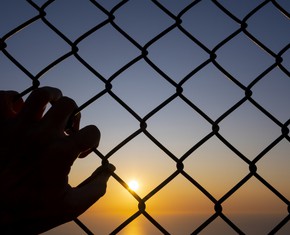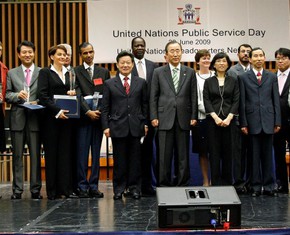The views expressed in our content reflect individual perspectives and do not represent the authoritative views of the Baha'i Faith.
In 1902 an intense, hardened Russian revolutionary named Vladimir Lenin, intent on overthrowing the oppressive regime of Czar Nicholas II, outlined his strategy in a pamphlet titled “What Is to Be Done?”
Lenin argued that the loosely-organized Bolshevik faction he headed needed to re-invent itself as a political movement and spread its message among the downtrodden masses in Russia as the best way to mount a revolutionary coup to topple the hated czarist regime. In time, Lenin’s guidance was heeded, and it worked.
“What is to be done” asks the central political, economic, public, and spiritual question, not merely for the early Bolsheviks, but for virtually every other civil, social, professional or religious community.
RELATED: Are Economic and Political Changes Leading Us Towards a Global Government?
Who Makes Governmental Policy?
The answer to “What is to be done?” is directly related to whoever has the responsibility for carrying out policy. In every totalitarian society, what is to be done usually depends on the action of a single, powerful leader whose vision and will determines the success of a strategy and the state. For example, in the ironically-named Democratic People’s Republic of Korea, the decisions of Kim Jong-Un, the General Secretary of the Workers’ Party of Korea, have the force of law, and any deviation from them is a crime.
In the United States of America, political, economic, and social decisions about what is to be done are made by the Democratic or Republican parties. As long as either party holds power in the Executive branch and in Congress, its polices and practices will prevail.
Totalitarian states embrace a top-down governing philosophy. The leader, while not necessarily always correct, has enormous and even unchecked power to do what he – historically, autocratic states have almost always been run by men – thinks is right.
The theory of democracy is that the best way to resolve the conflicts between differing views is to construct a political dynamic that plays to the needs of the largest and most powerful groups. In a democracy, the majority rules.
Autocratic regimes fail when their leaders make too many mistakes and misjudgments or become overconfident and sloppy. Democracies fail because the policies of the party in power are fixated on short-term gains in order to maintain political control. When a crisis erupts that cannot be manipulated by focusing on the interests of its supporters, the party in power is unable to respond to the worsening situation and loses control.
Does an Authoritarian Regime or a Democratic Republic Govern Best?
The fact is that neither the authoritarian nor democratic regimes we have today have proven themselves up to the task of governing in the modern world, where global problems such as environmental degradation, international peace and security, and economic inequality transcend and defy national borders and interests. Only an evolved form of global governance can respond meaningfully to the “What is to be done?” question in this day and age. The Baha’i teachings make this point quite clearly, as in this short quotation from Shoghi Effendi’s 1938 book The World Order of Baha’u’llah:
Some form of a world super-state must needs be evolved, in whose favor all the nations of the world will have willingly ceded every claim to make war, certain rights to impose taxation and all rights to maintain armaments, except for purposes of maintaining internal order within their respective dominions. Such a state will have to include within its orbit an international executive adequate to enforce supreme and unchallengeable authority on every recalcitrant member of the commonwealth; a world parliament whose members shall be elected by the people in their respective countries and whose election shall be confirmed by their respective governments; and a supreme tribunal whose judgment will have a binding effect even in such cases where the parties concerned did not voluntarily agree to submit their case to its consideration.
So, assuming that our systems of governance are slowly evolving toward that “world super-state,” what is to be done now?
Putting Process Before Policy
Actually, despite what Lenin said, that is the wrong question to ask. “What is to be done?” focuses solely on methods and results. The better and more effective issue to consider is: How shall we decide what to do? That query focuses on process, not policy.
Why is process more important than policy? Because policies are always in flux and change, depending on circumstance. Like battle plans, few political policies ever survive first contact with reality, and governments tend to wind up improvising – often badly – as a means of coping with changing conditions.
Process, by contrast, focuses on two factors, construction and addition:
1. Construction – Which ideas can we bring to the issue at hand?
2. Addition – More viewpoints means more possibilities to be considered, so what will it take to generate a broader and more diverse range of options.
The unique decision-making process which utilizes construction and addition – generally known as “consultation” in the Baha’i Faith – plays a crucial role, not just in the operation of the global Baha’i community itself, but also as an effective problem-solving method in general.
In the Baha’i view, the best way to resolve challenges large and small is to discuss them candidly in a setting that is open, non-adversarial, and devoid of ego, political pressures, and personal passion.
Baha’is believe it is essential to foster and focus on those character qualities that are critical to the process of successful consultation – including humility, selflessness, compassion, patience, and a willingness to consider non-traditional ideas and proposals.
RELATED: 3 Principles for Creating a New World Order
This may sound simple, but none of it is easy, and all of it requires persistent personal dedication, diligent training, and regular practice.
The advantage of Baha’i consultation is that it is cooperative rather than competitive, and focuses on fixing the problem instead of fixing the blame.
There is one more crucial difference, which lies at the heart of the Baha’i concept of humanity.
Unlike all other forms of political governance which believe that people are fundamentally egotistical and self-absorbed, a basic tenet of the Baha’i Faith is that individuals, as creatures of a loving God, are inherently good and decent.
While it is true that humans are fallible, make mistakes, and sometimes act in harmful and destructive ways, it is far more common for them to surrender their personal stake in an issue and act to support a common interest. Most importantly, humans can be persuaded to follow their best instincts and act in a productive, effective, and compassionate manner on a sustained basis.
Perhaps Shoghi Effendi, the Guardian of the Baha’i Faith, perceived the heart of the matter in a February, 1924 letter to the Baha’is of the United States, when he wrote:
… the keynote of the Cause of God is not dictatorial authority but humble fellowship, not arbitrary power, but the spirit of frank and loving consultation. Nothing short of the spirit of a true Baha’i can hope to reconcile the principles of mercy and justice, of freedom and submission, of the sanctity of the right of the individual and of self-surrender, of vigilance, discretion and prudence on the one hand, and fellowship, candor and courage on the other.
















Comments
Sign in or create an account
Continue with Googleor